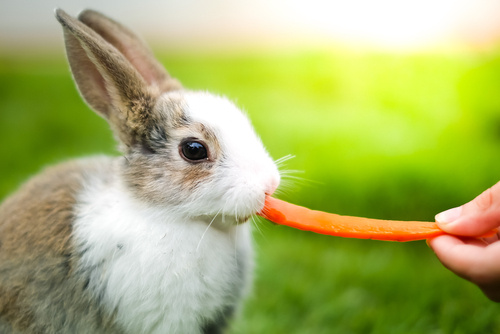- All products are added to your cart.
A rabbit with stomachache - tips for extra support for rabbits with diarrhea
Any animal can experience it: loose stools, or diarrhea. When your pet has diarrhea, it is not inherently concerning. Diarrhea is the body's way of eliminating foreign substances, such as from a stomach virus or food poisoning. In many cases, it resolves on its own. However, diarrhea poses additional risks for rabbits. Rabbits have very sensitive intestines. Diarrhea is not only very unpleasant for a rabbit but can quickly become life-threatening. However, young rabbits often suffer from diarrhea. Quickly identifying the source of the diarrhea is therefore essential.

Diarrhea in rabbits can be caused by various factors:
Diarrhea due to improper nutrition
When a rabbit receives improper nutrition, this is often reflected in the stool. A wrong diet quickly irritates the vulnerable intestines and results in changing stool. The stool can vary from soft to watery diarrhea. A common reason for diarrhea due to improper nutrition is a diet consisting of too many carbohydrates (such as mixed feed/nuggets or bread) combined with too little hay. Certain vegetables can also cause diarrhea. Pay attention, for example, to the amount of carrots you feed your rabbit. Carrots contain a lot of sugar, which can cause diarrhea in your rabbit. If diarrhea is the result of improper nutrition, this is a good signal to adjust the dietary pattern of your rabbit.
Diarrhea due to stress
During the growth of a young rabbit, the digestive system is still developing. They receive the bacteria necessary to balance a good intestinal flora from their mother. When a young rabbit is taken away from the mother too quickly, it may be that the intestinal flora is still too weak to cope with all the additional stress due to the move to the new owner, which can result in diarrhea.
Diarrhea due to coccidiosis
A common intestinal parasite that causes diarrhea in rabbits is coccidia. Coccidia are microscopic, single-celled parasites that occur in the intestines of a rabbit and are the cause of coccidiosis. The symptoms of coccidiosis usually occur during or shortly after stress. In general, the intestinal tract is affected first, resulting in diarrhea. In severe cases, the stool is very watery and may even contain blood. It is more common in young rabbits and is very dangerous. The rabbit quickly dehydrates as a result of coccidiosis, loses weight, becomes lethargic, and does not want to eat and/or drink anymore. In chronic infections, weight loss is most noticeable.
Diarrhea due to viral hemorrhagic syndrome (VHS)
Also, as a result of infection with the Viral Hemorrhagic Syndrome (VHS), a rabbit can get diarrhea. Diarrhea due to VHS is often very liquid and foul-smelling because the internal organs are affected. For more information on VHS, click here.
If you suspect coccidiosis or VHS, consult your veterinarian immediately. For better recovery from coccidiosis or to prevent recontamination with VHS or coccidiosis, you can also take some measures yourself:
-
Hygiene
When your rabbit has diarrhea due to coccidiosis, it is important to clean the rabbit's cage well. The oocysts in pellets of 36-48 hours old form spores that contaminate the environment. Therefore, the cage should be cleaned daily and filled with fresh straw. Thoroughly rinse all surfaces/materials with water. It is also important to add a cleaning agent to this. Clearzym® is an enzymatic cleaning agent that cuts organic dirt such as fats and proteins into tiny particles, making it easy to wash away the dirt. Additionally, it has the additional advantage that, unlike other enzymatic cleaning agents, it is very effective in cold water. Pellets, also in the living environment, are better removed immediately to prevent (re)contamination.
In the case of VHS, in addition to good cleaning, disinfection is of great importance. Disinfecting your rabbit cage with Virkon™S provides extra protection against VHS. Virkon™S differs from other disinfectants in that it is very effective against viruses. At a 1% concentration, Virkon™S has been shown to be effective against the Caliciviridae virus strain, which includes both VHS type 1 and VHS type 2.
Risk of diarrhea in rabbits
Diarrhea poses significant health risks. Especially young rabbits quickly dehydrate from this. Diluted stool is often a sign that the animal is receiving wrong nutrients. As long as the animal is not sick, it is often sufficient to give the animal only hay and water for a few days. If the diarrhea does not go away, or if the rabbit shows other signs alongside the diluted stool, consult a veterinarian quickly.
Additional support
When your rabbit has diarrhea, it is therefore very important to identify the cause to solve the problem as quickly as possible. However, addressing only the cause does not always seem to be the immediate solution. It takes some time for the bacterial flora of the intestines to fully recover. Good aftercare is essential to support the balance of the intestinal flora. ZooLac Propaste® stabilizes digestion and balances the bacterial intestinal flora by using good bacteria and the animal's own immune system. Because the intestinal flora is restored more quickly, your rabbit will also be relieved of diarrhea more quickly.
For further information on ZooLac Propaste® and the purchase of this probiotic, click here.
For more information on aftercare following diarrhea in rabbits, please contact info@zoolac.nl
---
Image source: AN Photographer2463/shutterstock.com


